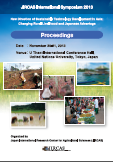Challenge to Introduce Japanese Technology to Thailand: Case Study in Food Allergen Analysis

Food allergy represents a growing public health concern in modern society as it is fatal hazard and there
is a remarkable increase in the number of sufferers, especially among babies and infants. Because no
medication for food allergy has been established, the single effective way to protect those allergic
individuals is the complete avoidance of hazardous allergenic food by the allergic individuals. Consequently,
the food allergen labeling regulation, which helps the allergic individuals to examine incorporated
hazardous food allergens in products through labels, has been enforced in many countries.
In Japan, food allergen labeling regulation was enforced in 2002. Given the enforcement, the analysis
of food allergens became significant in food allergen management with respect to monitoring food allergen
levels in food production and ensuring that food allergen contents in final products. Morinaga Institute has
been involved in food allergen analysis since 2002, and developed a novel analytical method to detect
food allergen in highly processed food, which was hardly analyzed before. Our method is adopted as the
official food allergen analysis method in Japan, and supports the food allergen management and labeling
regulation. The fact that no fatal accident by commercially processed food has been reported in Japan
since 2002 proves the effectiveness of Japanese food allergen management system, which consists of
regulation, management and analysis.
Intending to expand the use of our unique analytical method, we have challenged to introduce food
allergen analysis to Thailand, aiming to strengthen the safety of Thai food products, with the support of
the Ministry of Agriculture, Forestry and Fisheries.
As a beginning, we investigated the fundamental information about food allergy in Thailand. Our
preliminary survey revealed that common Thai people did not know well about food allergy. However,
our epidemiological survey collaborating with Thai major hospitals confirmed that 172 food allergic
individuals primarily for sea food, eggs, milk, wheat and peanuts were found and considerable number of
individuals had the experience of serious food allergic symptom, “Anaphylaxis.” Also, greater than half
of the allergic individuals had the experience of allergic symptoms after eating Thai commercial food, in
which they had checked for their hazardous food allergen through labels. Hence, Thai food allergic
individuals are longing for the adaption of food allergen labeling regulation, which Thailand still has not.
Whilst significant number of Thai food manufacturers, especially who export their products to Japan,
EU and USA, have already practiced food allergen management for their products due to requests from
foreign customers. Yet, some companies employ double labeling for identical products, i.e. label for
export with food allergen declaration and that for domestic without food allergen declaration. We have
observed that 15-18% of commercial food products sold in Thailand contained undeclared food allergen,
of which the level is greater than 10 ppm, and some products were found to contain high percentage level
of undeclared food allergen, which has high potential of eliciting serious allergic reactions to the food
allergic individuals.
Upon our investigations, we have confirmed that food allergy has become an emerging food safety
issue in Thailand, and we have confidence that our technology shall contribute to Thai society with respect
to protecting the domestic food allergic individuals and to increase the reliability of exported Thai food
products. At present, we are introducing our knowledge and technology to Thailand with our Thai partner,
Kasetsart University.
Under the global trend to establish international “Standard,” “Standardization” relating to food is also
under process. Like many others, the standardization and harmonization about food allergen management
are undertaken intensively by EU initiative. However, Japan, which is one of the most experienced in food
allergen management, is hardly involved to construct international standards, probably by political
influence, distance from Europe, language weakness etc. We hope that our challenge to introduce Japanese food allergen management technology to Thailand can contribute to the foundation of food allergen
management system in Thailand, and be an aid to input Japanese experience and technology to regional
“Standardization.”
| 刊行年月日 | |
|---|---|
| 作成者 | Masahiro Shoji |
| 著者キーワード |
Food allergy Food allergen analysis Food allergen labeling regulation Food allergen management Thailand |
| 公開者 | Japan International Research Center for Agricultural Sciences |
| オンライン掲載日 | |
| 号 | 2013 |
| 開始ページ | 191 |
| 終了ページ | 200 |
| 権利 | Japan International Research Center for Agricultural Sciences |
| 言語 | eng |
